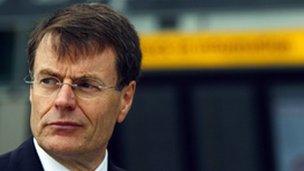BAA boss regrets passengers' pain over snow chaos
- Published

BAA boss Colin Matthews has vowed that Heathrow will tackle snow better in future
As financial analysts pick over the details of BAA's latest annual results, memories of last year's snow chaos at Heathrow Airport loom large. In his first full account of the crisis, the BAA chief executive admits deficiencies in the way the company dealt with the bad weather.
As head of Britain's biggest airport operator, Colin Matthews knows the scenes of snowbound runways and stranded passengers pictured in the weeks before Christmas are not something people will quickly forget.
The closure of both runways at Heathrow wrecked the holidays and business trips of hundreds of thousands of people and left airline companies incensed.
"I felt terrible about the situation that passengers were in," he said.
"In retrospect we should have been prepared for more. We must prepare for intense snow in the future."
His position now, with hindsight, is very different to the confident accounts of BAA snow plans issued by the company in November, external.
Boasting of highly trained staff and more than 60 high-tech snow-fighting machines, the BAA statement is titled "Heathrow's army of snow ploughs stretch their wings as the snow bites".
"I regret that statement, but we were confident because we had dealt with three quite severe snow incidents quite successfully in 2009 and 2010," Mr Matthews said.
'Angry passengers'
"What happened in December was a much bigger event."
The BAA chief spoke to File on 4 in advance of the outcome of an inquiry the company set up into the Heathrow events, external. It is expected to report before the end of March.
He also revealed the thinking which led him to give up his bonus of just under £1m in the wake of the Christmas chaos.
He said: "If someone loses a flight, a business flight, you get really angry, but when it's your Christmas holiday that you are losing, it's really infuriating.
"I didn't think it was appropriate to make complicated explanations or to blame someone else, but I do understand how angry passengers were.
"I didn't spend all that week, that weekend, thinking about what my bonus would be.
"But the question was put to me by the press, and I was really keen that our focus should be on the passengers and that's why I took the step I did."
BAA also told the BBC it was doubling its fleet of snow clearance vehicles to over 100, and more than tripling the number of staff trained to operate the equipment.
Before Christmas 60 staff were available, but by next winter the operator says there will be around 200.
'Monopoly-owned' airports
BAA has also come under fierce attack from one of the major airlines using Heathrow.
The chief executive of Virgin Atlantic Airways, Steve Ridgway, made it clear his company is deeply unhappy over BAA's performance in December. He said the airport should have been closed for no more than 24 hours.
"We're extremely angry and frustrated, because Heathrow should not have been closed as long as it was," he said.
Virgin Atlantic, which believes it lost £10m as a result of the disruption, announced in January that it would withhold airport fees from BAA in protest at its alleged lack of preparedness.
"Our reaction was around the frustration and lack of recourse that we airlines have with a monopoly-owned airport like BAA; in terms of what happened to passengers, how much it cost us, and how much it cost passengers."
The airline eventually backed down from the threat in the face of a risk that BAA might seize its planes, Mr Ridgway explained.
"Ultimately we do not want to put our flying and our customers at risk," he told the BBC.
The Virgin Atlantic chief executive also alleged that, despite snow problems in the previous two winters, airlines had not been fully consulted by BAA over its snow plan in the months leading up to this winter.
"The only engagement we had with the snow plan in 2010 was an exercise in October to look at some aspects of the communication plan. So there was no formal go-through with us in terms of the detail of the plan."
'Urgent' need for reform
Despite the severe criticism the company has faced, Transport secretary Philip Hammond admitted to the BBC that there is little the regulator or the government can do to discipline or punish BAA in the short term.
He acknowledges the need for reform is pressing:
"It is urgent. It has been urgent for some time," said Mr Hammond.
He said the government planned to bring in a bill which would allow airport operators to be held accountable to a much greater degree.
"It can be a regime based on regulatory interventions through fines or licence penalties," he added.
"But much more powerful is to get the regime based on economic incentives."
However Mr Hammond appeared to suggest that two further winters may elapse before tougher regulatory measures are in place:
"I'm afraid it'll be a couple of years before the regime is fully effective."
File on 4 is on BBC Radio 4 on Tuesday 22 February at 2000 GMT and Sunday 27 February at 1700 GMT. Listen again via the BBC iPlayer or download the podcast.
- Published17 February 2011
- Published11 February 2011
- Published23 December 2010
- Published22 December 2010
- Published21 December 2010
- Published19 December 2010